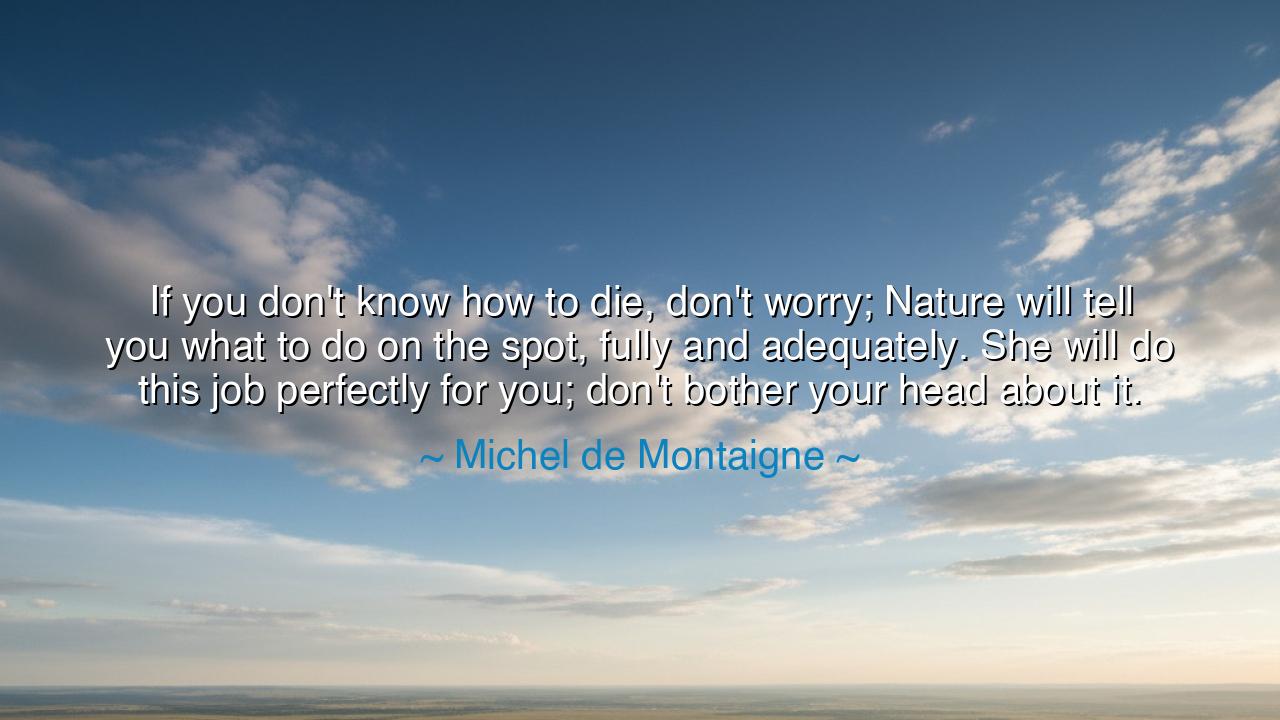
If you don't know how to die, don't worry; Nature will tell you
If you don't know how to die, don't worry; Nature will tell you what to do on the spot, fully and adequately. She will do this job perfectly for you; don't bother your head about it.






When Michel de Montaigne wrote, “If you don't know how to die, don't worry; Nature will tell you what to do on the spot, fully and adequately. She will do this job perfectly for you; don't bother your head about it,” he spoke not from arrogance, but from serenity—the quiet confidence of a man who had spent his life contemplating the human condition. His words, both tender and fearless, remind us that death, which men have feared since time immemorial, is not a problem to be solved nor an enemy to be conquered. It is simply the final act of Nature, who has guided us since the hour of our birth. Just as we did not learn to breathe or to grow, so too, Montaigne assures us, we need not learn how to die. Life itself will show us the way.
Montaigne lived in the sixteenth century, in an age shadowed by plague, war, and political unrest. Death was no distant abstraction to him—it was a constant presence, hovering at the edge of every thought. Yet, instead of fleeing from this reality, he turned toward it. Through his Essays, Montaigne sought to understand life not by denying mortality, but by accepting it. His reflections on death were not meant to breed despair, but freedom. For what can truly terrify the man who knows that even his dying will unfold as naturally as his living? In this, Montaigne stands among the wise of all ages, echoing the Stoics and the Buddhists alike: death is not to be resisted, but understood as the most natural act of life.
The heart of Montaigne’s message lies in trust—trust in Nature, in the very order that brought us into being. From our first breath to our last, we are part of a divine rhythm, an ancient cycle of birth and return. To fear death, he implies, is to mistrust the same force that once nurtured us in the womb, that heals our wounds, that renews the earth after every winter. Nature, in her infinite wisdom, has equipped every creature with the instinct to live—and, when the time comes, with the grace to die. The body knows how to yield, the heart knows how to let go, and the soul, though trembling, finds its home again in silence.
Consider the story of Socrates, the philosopher of Athens, who faced his own death with unshakable calm. When condemned to drink the poison hemlock, he did not resist, nor did he weep. Instead, he spent his last hours speaking of the immortality of the soul, comforting his friends as they mourned. “No evil can happen to a good man,” he said, “either in life or after death.” Like Montaigne, Socrates believed that death is not chaos, but completion—the moment when the soul, guided by Nature or by the divine, returns to its origin. In both men, we see the same radiant wisdom: that death is not an art to be mastered, but a truth to be accepted.
In our age, however, humanity has grown restless and fearful of endings. We build hospitals that hide death from sight, we speak of it in whispers, and we chase youth as though immortality were a right. But Montaigne’s words pierce through this illusion. He reminds us that death does not require our preparation or our control; it requires only our humility. When the hour arrives, the body and spirit will know what to do. The river does not need to be taught how to meet the sea; the leaf does not need to be instructed to fall. The same hand that set our heart beating will still it in due time, and we will pass, as all things do, back into the vastness from which we came.
The lesson, then, is not how to die well, but how to live well, so that death, when it comes, finds us at peace. If we spend our days fearing the end, we lose the joy of the middle. To live rightly is to walk each moment with awareness and gratitude, to act with kindness, and to embrace the fragility of existence as its most precious gift. Death, Montaigne tells us, is but one more experience—neither cruel nor kind, but natural. And when it comes, we will know what to do, for Nature will whisper it to us, as she has whispered every secret since the dawn of time.
So, my children of the mortal dawn, remember this wisdom: Do not fear death, and do not overthink it. Instead, turn your energy toward the art of living with openness, curiosity, and compassion. Each breath is both a beginning and an ending, each sunrise a rehearsal for eternity. When the final moment arrives, meet it as you would an old friend—without panic, without regret, and with the quiet trust that the same power that carried you through life will carry you through death. For as Montaigne teaches, Nature needs no guidance to finish her work, and she never fails to complete it perfectly.






AAdministratorAdministrator
Welcome, honored guests. Please leave a comment, we will respond soon